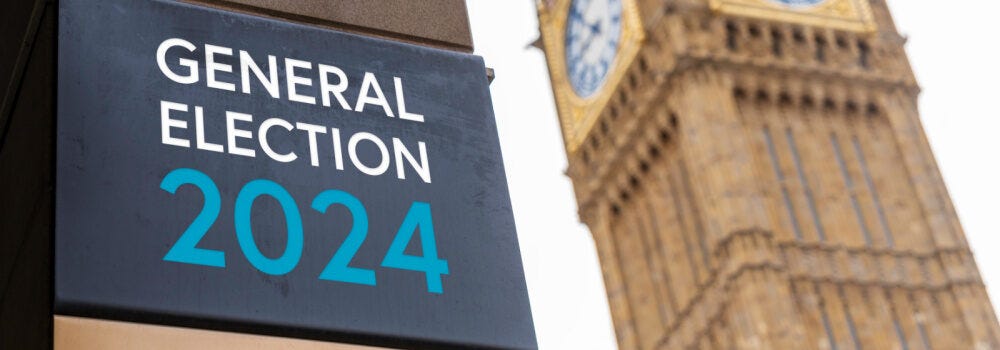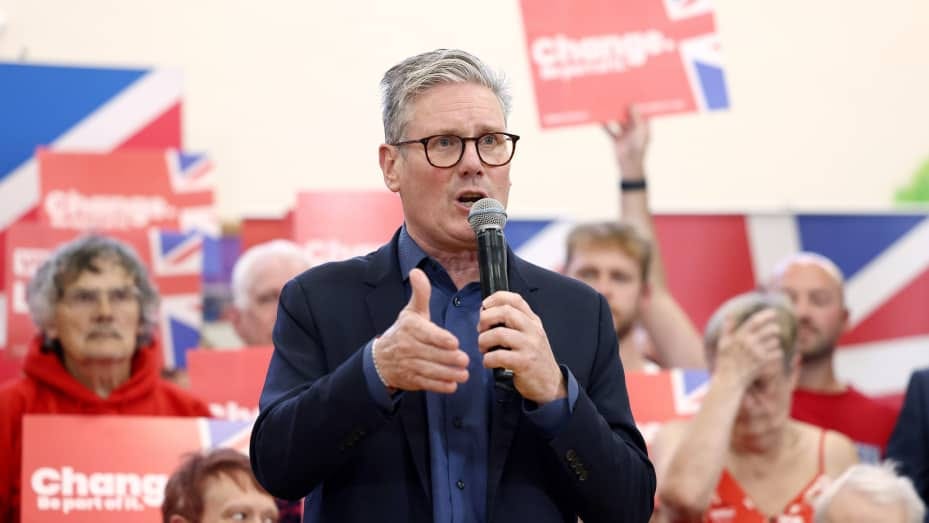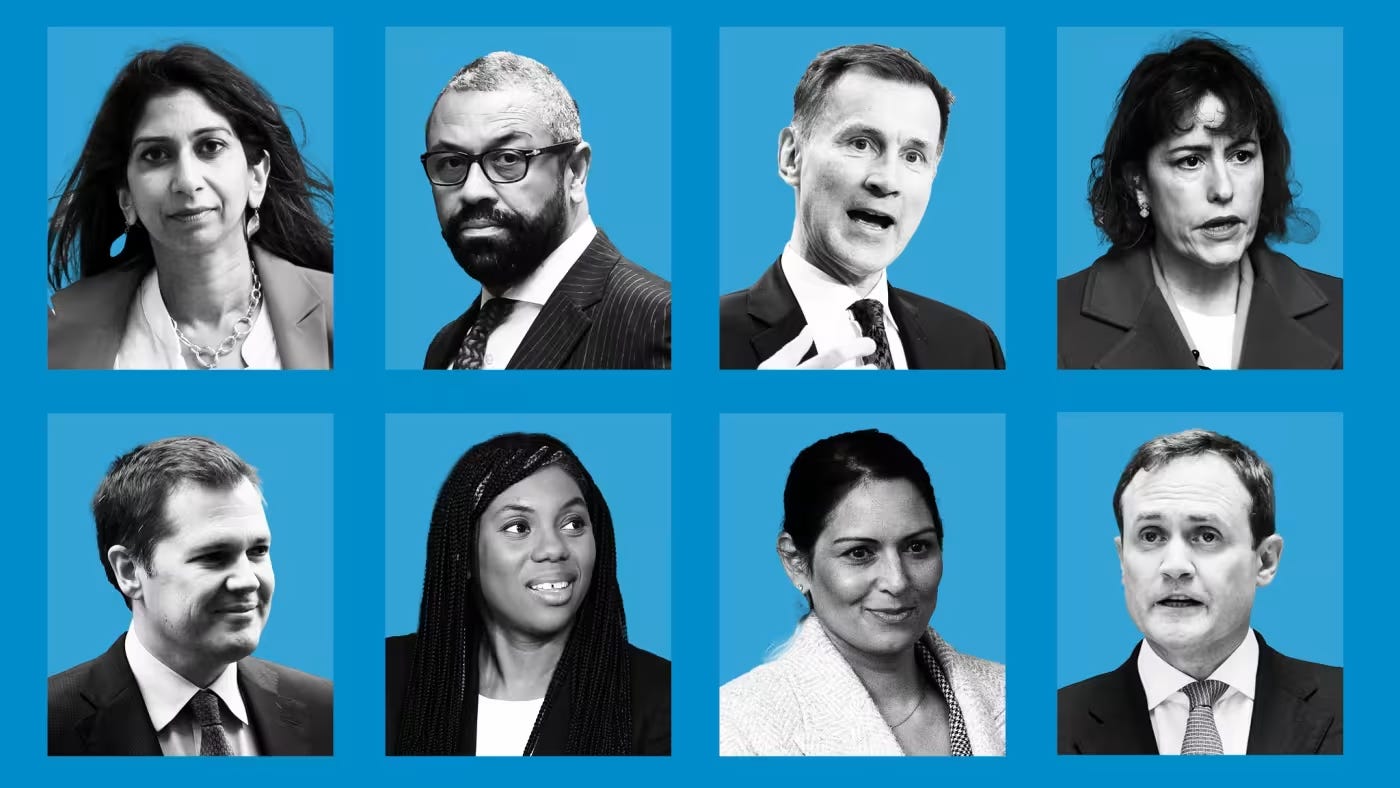The 2024 UK general election has ushered in a new era with a dramatic shift in the political landscape. The Labour Party's victory has secured them a significant majority and a powerful mandate to implement their ambitious agenda. This historic win symbolises renewed confidence in Labour's vision on one level, but caution as their seat count does not reflect their popularity with the voters more broadly. Meanwhile, the Conservative Party faces a period of deep introspection and strategic re-evaluation, grappling with the repercussions of their monumental defeat and contemplating their future direction.
The Labour Landslide
The Labour Party's resounding victory in the 2024 general election, securing a substantial majority in Parliament, marks a pivotal moment in UK politics. The Labour Party's commanding majority in Parliament translates into a robust legislative engine capable of enacting policies without support from opposition parties. This level of stability is crucial for the government to effectively implement its manifesto commitments, reducing the likelihood of parliamentary defeats on key issues and facilitating smoother governance. With this majority, Labour can confidently advance its agenda, encompassing healthcare, education, housing, and climate change reforms.
A decisive majority also mitigates the influence of smaller factions within the party, diminishing the risk of internal rebellions and fostering a more cohesive and unified government. This internal stability is essential for effectively implementing Labour's policies and strategic objectives. Moreover, a government bolstered by a strong majority enjoys enhanced negotiating power on both domestic and international fronts. This advantage is crucial in trade negotiations, international relations, and interactions with devolved UK administrations. The Labour Party's strengthened position thus equips them to pursue and achieve broader goals, reinforcing their capacity to drive meaningful and transformative change across the UK.
Image CNBC, 5 July 2024
Historical Precedents
The Labour Party's substantial majority in 2024 echoes significant landslide victories in post-World War II British history.
Tony Blair's Labour Government (1997-2001)
Elected in 1997 with a majority of 179 seats, Tony Blair's Labour government demonstrated the transformative power of a large parliamentary majority. Blair's administration, driven by the "New Labour" vision, enacted major reforms focusing on modernisation and public sector improvement. Key legislative achievements included the introduction of the minimum wage and devolving powers to Scotland and Wales. Substantial investments in education and health services underscored the government's capacity to implement long-term policies effectively. This majority also enabled Blair to manage internal party disputes and present a unified front, which was crucial during contentious decisions like the authorisation of the Iraq War.
Margaret Thatcher's Conservative Government (1983-1987)
Margaret Thatcher's Conservative government, re-elected in 1983 with a 144-seat majority, utilised its strong position to drive extensive economic reforms central to Thatcher's agenda. The government privatised state-owned industries and implemented deregulation to reduce public spending and try to stimulate economic growth. Thatcher's administration also enacted the sale of council houses to tenants and significant tax reforms. This decisive majority allowed Thatcher to govern effectively, particularly during contentious periods such as the miners' strike, and to undertake comprehensive long-term reforms in labour markets and public sector efficiency, fundamentally transforming the British economy.
Immediate Legislative Plans
The Labour Government plans to tackle key issues for voters by enacting legislation in the first 100 days. Prime Minister Starmer has scrapped the Rwanda asylum scheme, and Energy Secretary Ed Miliband has helped to reverse the de facto ban on onshore wind farms within weeks. Chancellor Rachel Reeves will direct the Office for Budget Responsibility (OBR) to prepare for the autumn budget, which is expected in October and includes a comprehensive spending review. Proposed tax changes include higher taxes on non-doms, windfall taxes on energy companies, and VAT on private school fees, with a consultation on increasing the tax paid by private equity chiefs, which is also in the works.
King’s Speech and Legislative Agenda
Building on actions in the first handful of weeks in office, Labour will set out their legislative agenda in the King's Speech. In the speech, the Labour Government will likely introduce legislation empowering the OBR to publish forecasts for major fiscal events independently. Employment reforms will focus on making work pay, cracking down on zero-hours contracts, and extending equal pay protections to ethnic minorities and disabled workers. The government plans to set up key green energy initiatives through GB Energy, address antisocial behaviour, and create a new offence for the criminal exploitation of children. Additional legislative plans include establishing a new Parliamentary Integrity and Ethics Commission, nationalising the railways gradually, and introducing bills on planning reform, football governance, tobacco and vapes, and renters' reform.
Challenges and Outlook
Despite their strong position, Labour faces challenges with tight public finances and a mandate that may not be as strong as desired. The party must act quickly to implement key policies to ensure they take effect and drive their desired growth. This Labour landslide presents an opportunity for transformative governance, echoing historical precedents where substantial majorities enabled significant policy achievements. However, the government must navigate financial constraints and public expectations to realise its ambitious agenda.
Where to now for the Conservative Party?
Just as the general election was good for the Labour Party, it proved far less fruitful for the Conservatives. After suffering record losses, the Conservative Party faces a critical juncture. This moment calls for an urgent reassessment of its direction under new leadership, with two distinct paths emerging: moving further to the right or shifting back towards the centre.
Moving to the Right
One option for the Conservative Party is to embrace a more right-wing stance. Candidates like Kemi Badenoch, Suella Braverman, and Priti Patel represent this direction, emphasising traditional conservative values, strict immigration policies, and robust national security measures. This approach could solidify the party's core base but risks alienating moderate voters. Badenoch, the former Secretary of State for Business and Trade, is known for her strong views on cultural and social issues, such as her opposition to critical race theory and championing free speech and conservative values.
Similarly, Suella Braverman, the former Home Secretary, is recognised for her hardline views on immigration and law and order. A staunch supporter of Brexit, she advocates for reducing immigration and prioritising national security. Her leadership would likely emphasise strict immigration policies and a tougher stance on crime. Priti Patel, another former Home Secretary, has been a key figure in the party's right-wing faction, known for her stringent immigration policies and strong stance on law enforcement.
Financial Times, 6 July 2024
Shifting Back to the Centre
Alternatively, the party could pivot towards a more centrist, pragmatic approach. Candidates like Tom Tugendhat, James Cleverly and Jeremy Hunt would likely advocate for policies focused on economic stability, public services, and inclusive social policies to appeal to a broader electorate and restore trust among disillusioned voters. Tugendhat, former Chair of the Foreign Affairs Committee and Minister of State for Security is seen as a centrist who advocates for a pragmatic approach to governance. His leadership would likely focus on national security, international relations, and appealing to moderate voters through balanced economic and social policies.
James Cleverly, the former Foreign Secretary, known for his pragmatic approach and diplomatic skills, could move the party towards the centre. His leadership would focus on rebuilding international relations, economic diplomacy, and pragmatic governance, appealing to a broader electorate. Jeremy Hunt, a former Chancellor of the Exchequer and Foreign Secretary, emphasises economic stability and healthcare reforms. His leadership would likely focus on restoring economic confidence and improving public services, appealing to voters seeking competent and balanced governance.
Historical Party Leadership Elections
Conservative Party Leadership Election, 1990
The Conservative Party leadership election in 1990 began amidst growing dissatisfaction with Margaret Thatcher’s leadership style and policies, particularly the controversial poll tax. The party was divided between those wanting to continue Thatcher’s strong right-wing policies, emphasising economic liberalism and reducing state intervention, and those advocating for a more centrist approach to unite the party and address public discontent. Michael Heseltine emerged as a challenger, representing the latter viewpoint. Although Thatcher won the first ballot, she did not achieve the necessary margin and subsequently resigned. John Major emerged as a compromise candidate, won the subsequent ballots and led the Party to a surprising victory in the 1992 general election. However, internal party divisions grew during his term, contributing to Labour’s landslide victory in 1997.
Conservative Party Leadership Election, 2005
The Conservative Party leadership election in 2005 occurred after Michael Howard resigned following the party’s defeat in the general election. The contest was characterised by a divide between David Davis, who represented a traditional Conservative stance focusing on immigration and Euroscepticism, and David Cameron, who sought to modernise the party and make it more inclusive and centrist. Cameron won the leadership and led the Conservatives to victory in the 2010 general election, forming a coalition with the Liberal Democrats, and secured a majority in the 2015 election, steering the party towards the centre on many social issues and ultimately allowing for the Brexit referendum.
The future direction of the Conservative Party hinges on the lessons they take from this election. They must decide whether their losses stemmed from not being right-wing enough, losing out to Reform’s platform, or if the public viewed them as niche, inept and corrupt, necessitating a return to the centre for stability and to revamp the Party, much as Kier Starmer did with the Labour Party following Corban.
The Labour Party's landslide victory presents a unique opportunity to reshape the UK's social and economic fabric, drawing on historical precedents to deliver transformative governance. However, the real test lies ahead: navigating financial constraints and public expectations to fulfil their ambitious promises. This election marks a critical juncture for the Conservatives, demanding a strategic overhaul to regain public trust and political relevance. As the dust settles, the UK's political dynamics are poised for a profound transformation, challenging both parties to redefine their roles and chart a new course for the nation's future.






